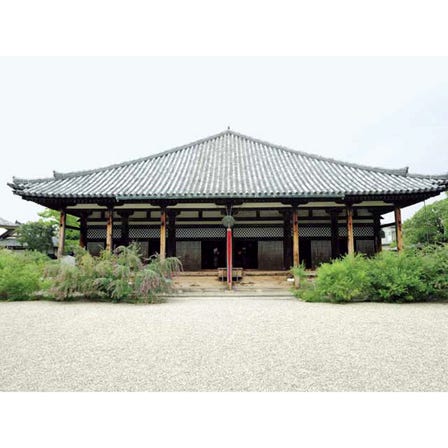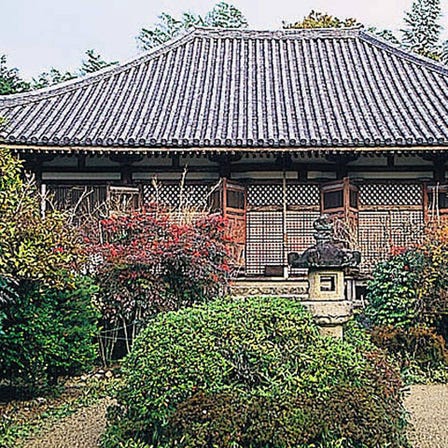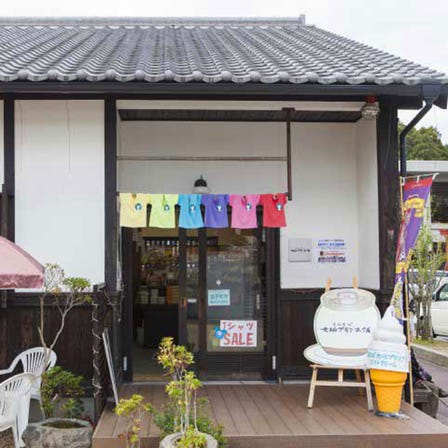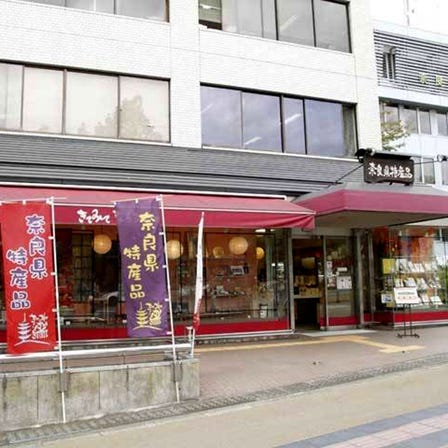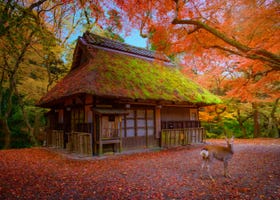Description
Stretching about four kilometers from east to west and about two kilometers from north to south in eastern Nara, Nara Park covers a vast territory exceeding 500 hectares. Established as a park in 1880, it lies adjacent to some of Japan's best-known temples and shrines. A stroll around the Park will take you to such celebrated spots as Todai-ji Temple, Kofuku-ji Temple, and Kasuga-taisha Shrine as well as cultural attractions like the Nara National Museum and Nara Kasugano International Forum. About 1,300 deer, believed to be the messengers of the deity enshrined in Kasuga-taisha Shrine roam the park. Feel free to feed them shika senbei (deer biscuits), but watch out—some of the bolder ones may even try eating your map!
Sarusawa-ike Pond, a quaint and scenic spot sublimely reflecting the five-story pagoda on its surface
Sarusawa-ike Pond is an artificial pond you'll find to the south of Kofuku-ji Temple. Sublimely reflecting the five-story pagoda of Kofuku-ji Temple and surrounding willow trees, the pond has earned a reputation as one of Nara Parks most scenic spots. Beside the pond sits Uneme-jinja Shrine, home to the spirit of Uneme, who had lost the emperor's favor and committed suicide by jumping into the pond. The Uneme Festival takes place every year at the shrine on the day of harvest moon.
Enjoy a grandstand view of Nara's temples, shrines and streets from Mt. Wakakusa, a picturesque lookout since ancient times
The district encompassing Mt. Kasuga, Mt. Wakakusa, and Kasugano field has been a popular lookout since the ancient Manyo era. Rising 342 meters above sea level, Mt. Wakakusa is also called Mt. Mikasa (mountain of three straw hats) because the three round hills resemble overlapping straw hats. This beautiful grassy hill offers a commanding view across the Great Buddha Hall, the five-story pagoda and the Nara Basin. The walk from the gate to the summit takes 30 to 40 minutes.
Forest bathing in the pristine primeval forests of the sacred mountain
Kasugayama Primeval Forest spreads across the eastern part of Nara Park. Deforestation on the sacred mountain of Kasuga-taisha Shrine has been prohibited since the Nara period, well over a millennium ago. This means the forest retains its pristine quality, and you can immerse yourself in its ancient beauty with a ”forest bath” as you wander the walking paths.
Location Information
-
- Address
-
The area covering Kasugano-cho, Zoshin-cho, Takabatake-cho, and Noborioji-cho in Nara, Nara, 630-0000
-
- Nearest Station
-
Kintetsunara Station
・ Kintetsu-nara Line
5 minutes on foot
-
- Phone Number
-
0742-22-0375Available languagesonly in Japanese
-
- Closed
- None
-
- Public Site
- Official Site
Recommended Spots in Area
- Visiting
- Eating
- Shopping
- Lodgings
-
TokaNara, Ikoma, TenriYakiniku
-
ShabukuraNara, Ikoma, TenriShabu Shabu
-
Kurokawa Honke Cafe, Todaiji BranchNara, Ikoma, TenriOther Cafes and Sweets
-
TEN. TEN. CafeNara, Ikoma, TenriOther Cafes and Sweets
-
Mahoroba Daibutsu Pudding Honpo Yumekaze Square BranchNara, Ikoma, TenriOther Cafes and Sweets
-
Restaurant & Cafe Pao Naramachi ShopNara, Ikoma, TenriOther Cafes and Sweets




















